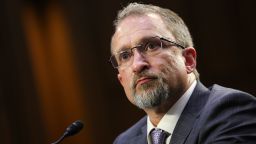Billionaire Elon Musk and Twitter CEO Parag Agrawal did not sit for depositions Monday as part of an ongoing merger lawsuit despite earlier scheduling notices filed in a Delaware court, marking another twist in a closely watched case about the future of one of the world’s most influential social media platforms.
The testimony of both men is considered central in the litigation over Musk’s deal to buy — and then his attempt to get out of buying — Twitter for $44 billion.
Earlier court filings had indicated Musk would be deposed starting on Sept. 26, while a filing Saturday said Agrawal was also due to be questioned starting Monday morning. One person familiar with the matter said Agrawal’s deposition is being rescheduled.
Sources familiar with the situation told CNN the dates listed in deposition notices filed with the court are not always the dates that the two sides agree to officially begin the questioning. Still, the two sides appeared to be at odds about the plans.
Musk’s lawyer, Alex Spiro, had flown to San Francisco Sunday expecting to take part in Monday’s deposition of Agrawal, another of the people familiar with the case told CNN. That day, Musk’s team learned of Agrawal’s rescheduling, the person said. It was not immediately clear whether a new date has been selected.
Twitter declined to comment.
Musk’s deposition notice dated Sept. 19 said the entrepreneur was set to testify in Delaware starting Monday morning; however, Spiro said Monday afternoon Musk was not actually scheduled to be questioned on that date.
Musk is still expected to be deposed this week, one of the people familiar said.
The adjustments to the schedule come ahead of a three-hour hearing scheduled for Tuesday in which the two sides will present arguments on several outstanding discovery matters, including Musk’s team’s request for some additional account data from Twitter and a request from Twitter related to a court order requiring Musk’s team to produce information related to its expert analysis of bots on the platform. Materials gathered during discovery, such as internal documents and communications, are often used to inform the questioning during depositions, Brooklyn Law School Professor Andrew Jennings told CNN.
“Depositions are a time that culminates the discovery process,” Jennings said, adding that the two sides may want to wait to complete such key depositions until they receive materials related to their outstanding discovery requests. “There may still be some back and forth on document discovery, unsettled disputes that are driving some of this.”
Musk has sought to extricate himself from the merger agreement, first by claiming that Twitter’s spam account problem is far greater than it has let on, and later by citing allegations of longstanding unaddressed security vulnerabilities disclosed by the company’s former head of security, Peiter “Mudge” Zatko.
Those allegations, which were also submitted to the US government under a whistleblower process, were first reported by CNN and The Washington Post last month.
Agrawal’s deposition could be a chance for Musk’s team to question him about Zatko’s whistleblower allegations. Zatko led Twitter’s security team from November 2020 until he was fired in January. Twitter has previously said that Zatko’s allegations paint a “false narrative” of the company and that Musk’s claims are “factually inaccurate, legally insufficient and commercially irrelevant.”
Earlier this month, leading members of the Senate Judiciary Committee sent Agrawal a letter seeking similar information, and requested responses by Sept. 26, but it is not clear whether Twitter has responded to the letter. The committee did not immediately respond to a request for comment. Agrawal also turned down an invitation to testify at a Senate committee hearing alongside Zatko earlier this month citing the litigation with Musk, according to Sen. Chuck Grassley.
Twitter and Musk are set to go to trial over the acquisition disputein mid-October.








